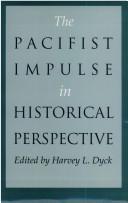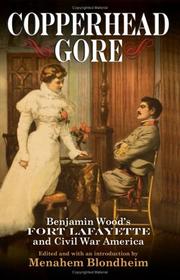| Listing 1 - 10 of 149 | << page >> |
Sort by
|
Book
ISBN: 0739187198 9780739187197 9780739187180 073918718X 9781498530545 1498530540 Year: 2016 Publisher: Lanham, Maryland : Lexington Books,
Abstract | Keywords | Export | Availability | Bookmark
 Loading...
Loading...Choose an application
- Reference Manager
- EndNote
- RefWorks (Direct export to RefWorks)
Mainstreaming Pacifism: Conflict, Success, and Ethics covers the history of philosophy concerning successful political means, and proposes an original interpretation of Machiavelli, Montesquieu, Marx and Gandhi. The book counters the objection that pacifism is ineffective, and proposes that pacifism is not for a sect, but rather draws its most effective strategies from, and contributes them to, the mainstream political tradition.
Pacifism. --- Peace --- Sociology, Military --- Evil, Non-resistance to --- Nonviolence
Book
ISBN: 9781400878734 140087873X 069164912X 0691005613 0691622345 9780691649122 Year: 1968 Publisher: Princeton, New Jersey : Princeton University Press,
Abstract | Keywords | Export | Availability | Bookmark
 Loading...
Loading...Choose an application
- Reference Manager
- EndNote
- RefWorks (Direct export to RefWorks)
Selected portions from Pacifism in the United States: From the Colonial Era to the First World War Originally published in 1968.The Princeton Legacy Library uses the latest print-on-demand technology to again make available previously out-of-print books from the distinguished backlist of Princeton University Press. These editions preserve the original texts of these important books while presenting them in durable paperback and hardcover editions. The goal of the Princeton Legacy Library is to vastly increase access to the rich scholarly heritage found in the thousands of books published by Princeton University Press since its founding in 1905.
Pacifism. --- Peace --- Sociology, Military --- Evil, Non-resistance to --- Nonviolence
Book
ISBN: 0585227756 9780585227757 Year: 1988 Volume: 3 Publisher: Scottdale, Pa. : Herald Press,
Abstract | Keywords | Export | Availability | Bookmark
 Loading...
Loading...Choose an application
- Reference Manager
- EndNote
- RefWorks (Direct export to RefWorks)
Nonviolence --- Evil, Non-resistance to --- Christians --- Christianity --- Religion --- Philosophy & Religion --- Religious adherents --- Non-resistance to evil --- Pacifism --- Non-violence --- Government, Resistance to --- Religious aspects --- Case studies. --- Case studies

ISBN: 0802007775 9786612008153 1282008153 1442682000 9781442682009 9781282008151 9780802007773 Year: 1996 Publisher: Toronto, [Ontario] ; Buffalo, [New York] ; London, [England] : University of Toronto Press,
Abstract | Keywords | Export | Availability | Bookmark
 Loading...
Loading...Choose an application
- Reference Manager
- EndNote
- RefWorks (Direct export to RefWorks)
The opening chapter pays tribute to the pioneering leadership and scholarly accomplishments of Peter Brock and the volume includes a complete bibliography of his work in the field of peace history. The essays, presented in four parts, concentrate on the main areas of contemporary scholarship in peace history. 'Approaches to Peace History' explores conceptual issues and methods. 'Christian Traditions of Pacifism and Non-resistance' covers topics from the problem of non-violence and war in the early church, through Mennonite and Brethren traditions in the sixteenth century, to the present-day Quaker peace testimony. 'Gandhi and the Indian Tradition of Non-violence' looks at the role of violence and non-violence in Hindu and Buddhist thought and practice and in the development of Gandhi's intellectual and moral outlook. 'Pacifism and Peace Movements in the Modern World, 1890-1955' considers various aspects of the interrelationship between pacifists and internationalists and the broader movement advocating world peace. Also considered is the role of women in peace movements. This volume of twenty-three essays appears in recognition of the emergence of peace history as a relatively new and coherent field of learning. ... these essays were presented at an international conference "The Pacifist Impulse in Historical Perspective". ... Together the essays in this book explore the ideas and activities of persons and groups who, for two millennia, have rejected war and urged non-violent means of settling conflicts
Pacifism --- History --- Peace --- Sociology, Military --- Evil, Non-resistance to --- Nonviolence --- Congresses
Book
ISBN: 1681956802 Year: 2004 Publisher: Project Gutenberg
Abstract | Keywords | Export | Availability | Bookmark
 Loading...
Loading...Choose an application
- Reference Manager
- EndNote
- RefWorks (Direct export to RefWorks)
National characteristics --- East Indian --- Government --- Resistance to --- Evil --- Non-resistance to

ISBN: 9786612072772 0253111900 1282072773 1433708477 9780253111906 9780253218476 0253218470 9780253347374 0253347378 9781282072770 0253218470 0253347378 6612072776 9781433708473 Year: 2006 Publisher: Bloomington : Indiana University Press,
Abstract | Keywords | Export | Availability | Bookmark
 Loading...
Loading...Choose an application
- Reference Manager
- EndNote
- RefWorks (Direct export to RefWorks)
Harriet Beecher Stowe's Uncle Tom's Cabin has often been cited for its galvanizing effect on anti-slavery opposition in the years before the American Civil War. Southern sympathizers in the North (known as Copperheads) never came close to producing anything that matched its influence. One of the more interesting attempts was Fort Lafayette; or, Love and Secession (1862). The novel -- which features liberal doses of love and lust, intrigue and violence, loyalty and death -- is by no means great literatu
Pacifism --- Peace --- Sociology, Military --- Evil, Non-resistance to --- Nonviolence --- United States --- History
Book
ISBN: 0691631174 069160147X 1400859700 9781400859702 9781306986496 1306986494 9780691631172 9780691601472 Year: 1988 Publisher: Princeton, New Jersey : Princeton University Press,
Abstract | Keywords | Export | Availability | Bookmark
 Loading...
Loading...Choose an application
- Reference Manager
- EndNote
- RefWorks (Direct export to RefWorks)
The crusade against nuclear weapons in Great Britain, West Germany, France, and the Netherlands in the early 1980s dwarfed all previous protest movements in Western Europe in the postwar period. What produced the demonstrations against NATO's decision in December 1979 to base 572 cruise and Pershing II missiles in five West European countries? What generated the widespread support that the demonstrators enjoyed? Contrary to the frequent claim that such political movements are a symptom of governmental crisis in the advanced industrial democracies, Thomas Rochon develops the idea that they arise from a creative impulse and perform crucial functions of innovative criticism. He concludes that the West European peace movement has ignited a public debate in which reduction or elimination of certain categories of nuclear weapons is taken seriously for the first time.Among the topics examined are the sources of support for the peace movement in public opinion, the types of people who joined or supported the movement, and proposals they offered for a nonnuclear defense policy. The author discusses the organization of the movement and its choice of tactics, its impact on politics, and the links between it and other institutions such as churches, trade unions, and political parties.Originally published in 1988.The Princeton Legacy Library uses the latest print-on-demand technology to again make available previously out-of-print books from the distinguished backlist of Princeton University Press. These editions preserve the original texts of these important books while presenting them in durable paperback and hardcover editions. The goal of the Princeton Legacy Library is to vastly increase access to the rich scholarly heritage found in the thousands of books published by Princeton University Press since its founding in 1905.
Antinuclear movement --- Pacifism. --- Peace movements --- Peace --- Sociology, Military --- Evil, Non-resistance to --- Nonviolence
Book
Abstract | Keywords | Export | Availability | Bookmark
 Loading...
Loading...Choose an application
- Reference Manager
- EndNote
- RefWorks (Direct export to RefWorks)
Christianity --- Essence --- genius --- nature --- Evil --- Non-resistance to --- Government --- Resistance to --- Religious aspects
Book
Abstract | Keywords | Export | Availability | Bookmark
 Loading...
Loading...Choose an application
- Reference Manager
- EndNote
- RefWorks (Direct export to RefWorks)
Christianity --- Essence --- genius --- nature --- Government --- Resistance to --- Religious aspects --- Evil --- Non-resistance to
Book
ISBN: 1438428634 1441625968 9781441625960 9781438428611 9781438428635 1438428618 1438428626 9781438428628 Year: 2009 Publisher: Albany : State University of New York Press,
Abstract | Keywords | Export | Availability | Bookmark
 Loading...
Loading...Choose an application
- Reference Manager
- EndNote
- RefWorks (Direct export to RefWorks)
Advocates of pacifism usually stake their position on the moral superiority of nonviolence and have generally been reluctant or unwilling to concede that violence can be an effective means of conducting politics. In this compelling new work, which draws its examples from both everyday experience and the history of Western political thought, author Dustin Ells Howes presents a challenging argument that violence can be an effective and even just form of power in politics. Contrary to its proponents, however, Howes argues that violence is no more reliable than any other means of exercising power. Because of this there is almost always a more responsible alternative. He distinguishes between violent and nonviolent power and demonstrates how the latter can confront physical violence and counter its claims. This brand of pacifism gives up claims to moral superiority but recuperates a political ethic that encourages thoughtfulness about suffering and taking responsibility for our actions.
Political violence. --- Pacifism. --- Peace --- Sociology, Military --- Evil, Non-resistance to --- Nonviolence --- Violence --- Political crimes and offenses --- Terrorism
| Listing 1 - 10 of 149 | << page >> |
Sort by
|

 Search
Search Feedback
Feedback About UniCat
About UniCat  Help
Help News
News